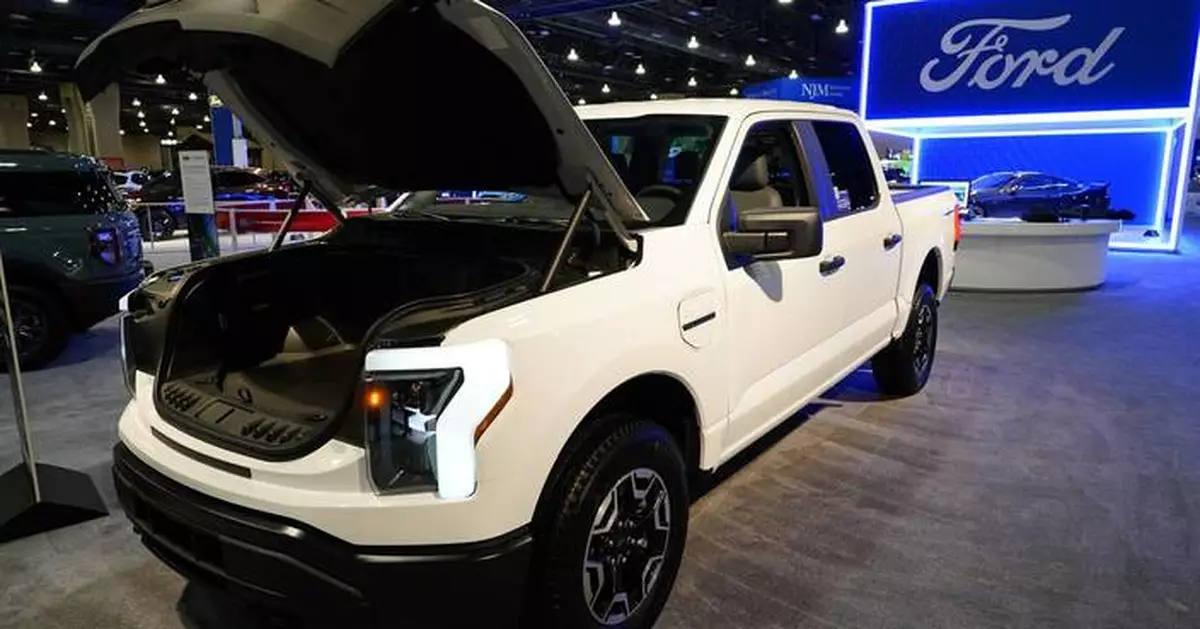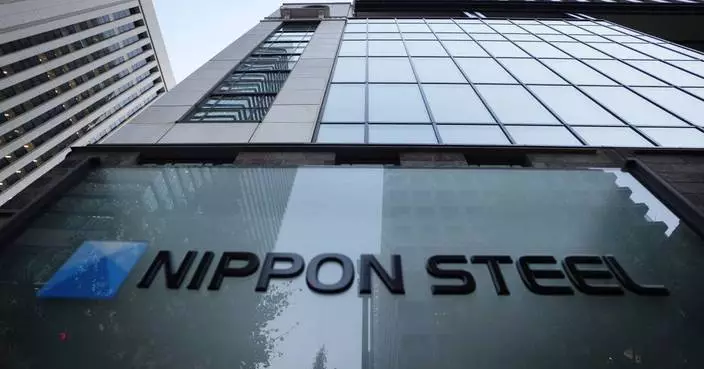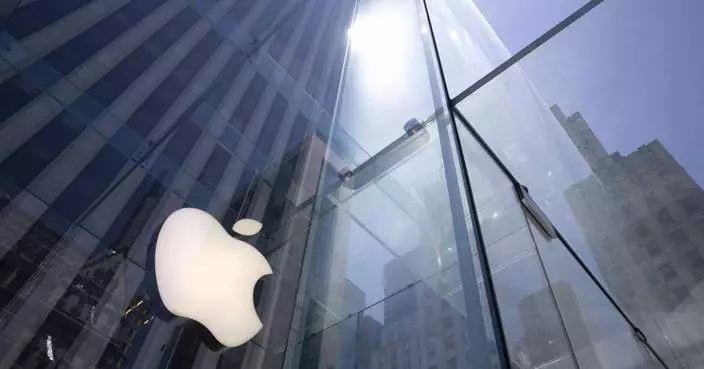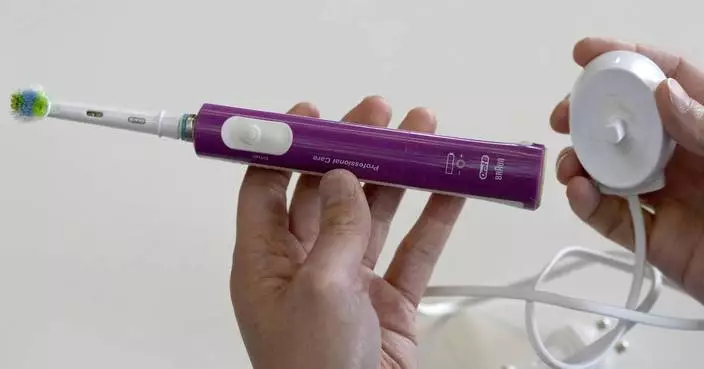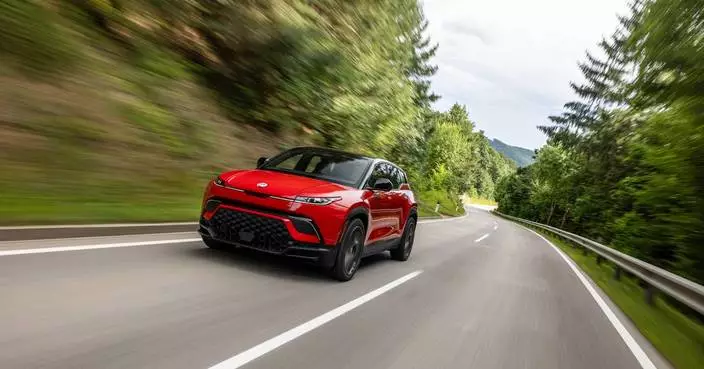DETROIT (AP) — With U.S. electric vehicle sales starting to slow, Ford Motor Co. says it will delay rolling out new electric pickup trucks and a new large electric SUV as it adds gas-electric hybrids to its model lineup.
The Dearborn, Michigan, company said Thursday that a much ballyhooed new electric pickup to be built at a new factory in Tennessee will be delayed until 2026.
The big electric SUV, with three rows of seats, will be delayed by two years until 2027 at the company's factory in Oakville, Ontario near Toronto.
The retreat comes as U.S. electric vehicle sales growth slowed to 3.3% in the first quarter of the year, far below the 47% increase that fueled record sales and a 7.6% market share last year. Sales of new vehicles overall grew 5.1%, and the EV market share declined to 7.15%.
Hybrid sales, however, grew 45% from January through March, while plug-in hybrids, which can go a short distance on battery power before a gas-electric system kicks in, grew 53% according to Motorintelligence.com.
Ford also said it “expects to offer” hybrid versions of all its gasoline passenger vehicles by the end of the decade in North America.
Industry analysts say most early technology adopters and people who want to cut emissions have already purchased EVs. Automakers now have to convince skeptical mainstream buyers to go electric, but those customers fear limited range and a lack of charging stations.
Ford expects pretax losses for its electric vehicle unit to widen from $4.7 billion last year to a range of $5 billion to $5.5 billion this year. But it foresees commercial vehicles making $8 billion to $9 billion, up from $7.2 billion last year. Gasoline powered vehicles and hybrids are expected to make $7 billion to $7.5 billion, about even with last year.
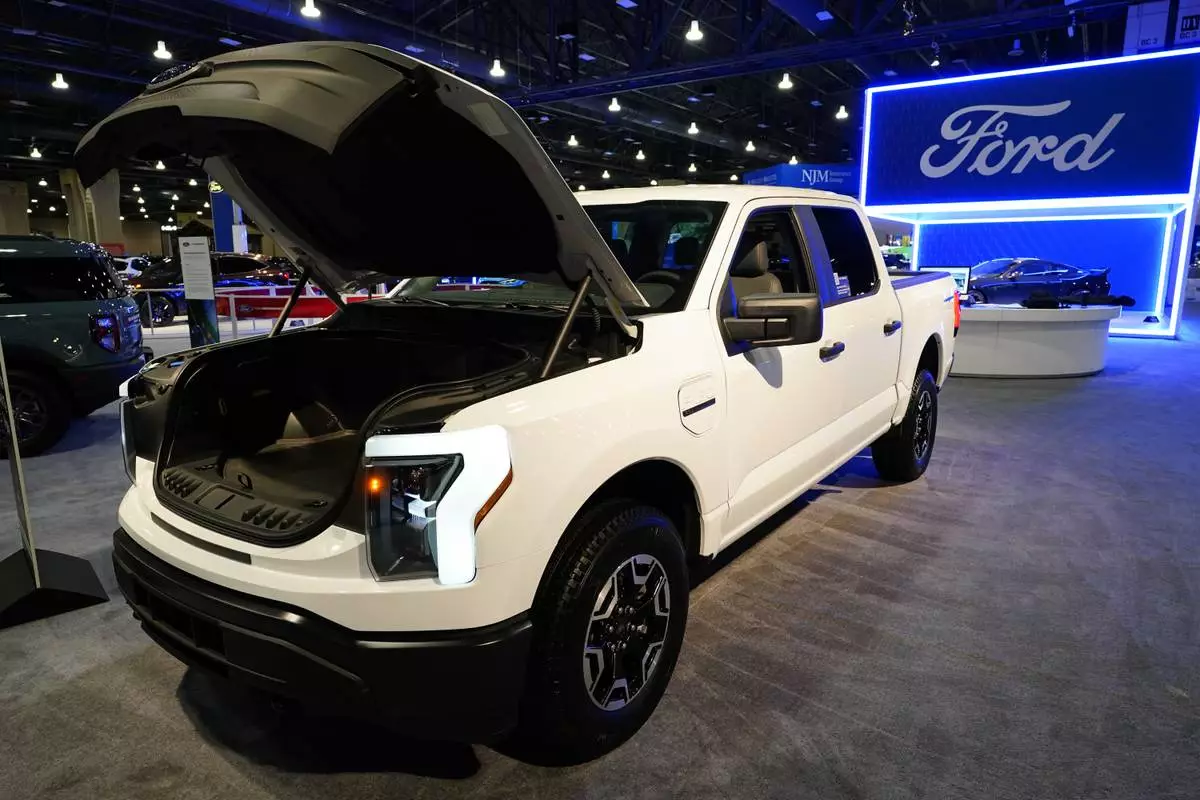
FILE - The Ford F-150 Lightning displayed at the Philadelphia Auto Show, Friday, Jan. 27, 2023, in Philadelphia. With U.S. electric vehicle sales starting to slow, Ford Motor Co. says, Thursday, April 4, 2024, it will delay rolling out new electric pickup trucks and a new large electric SUV as it adds gas-electric hybrids to its model lineup. (AP Photo/Matt Rourke, File)
DETROIT (AP) — The U.S. government on Friday loosened some rules governing electric vehicle tax credits, potentially making more EVs eligible for credits of up to $7,500 but leading critics to accuse the Biden administration of helping China.
The Treasury Department announced final regulations for the credits under the 2022 Inflation Reduction Act, giving automakers more time to comply with some provisions about where battery minerals can come from.
The credits range from $3,750 to $7,500 for new EVs. There's also a $4,000 credit for used ones.
They're aimed at juicing demand for EVs in an effort to reach a Biden administration goal that half of all new vehicle sales be electric by 2030. This year the credits are available at the time a vehicle is purchased from an authorized dealer rather than waiting for an income tax refund.
Qualifying for the credits depends on a person's income, the price of the vehicles and requirements related to battery makeup and minerals that get tougher each year. To get the credits, EVs must be assembled in North America. Some plug-in hybrids also can qualify.
Starting this year, complex rules are being phased in to promote development of a domestic electric vehicle supply chain. The rules would limit EV buyers from claiming the full tax credit if they purchase cars containing battery materials from China and other nations “of concern” that are considered hostile to the United States. Those include Russia, North Korea and Iran.
Under the final rule, however, small amounts of graphite and other minerals used in batteries would be exempt from the restriction until 2027, because their country of origin is nearly impossible to trace, officials said. Without the exemption, some vehicles that met nearly all of the requirements could get knocked out of tax credit eligibility due to tiny amounts that couldn’t be traced, Treasury said.
The National Mining Association slammed the new exemptions as a giveaway to China.
“Congress created these tax incentives to secure our supply chains and generate American jobs while supporting EV adoption. They did not intend for loopholes to be created that essentially amount to a blank check from the American taxpayer to China,” said Rich Nolan, the mining lobby’s president and CEO.
West Virginia Sen. Joe Manchin, the Democratic chairman of the Senate Energy and Natural Resources Committee, said that through the new rule, the Biden administration “is effectively endorsing ‘made in China.’ ”
Manchin, who played a key role in passage of the Inflation Reduction Act, President Joe Biden’s landmark climate law, said the law specifically prohibits EVs that contain materials from foreign adversaries such as China and Russia from being eligible for the tax credit after 2024. “But now Treasury has provided a long-term pathway for these countries to remain in our supply chains. It’s outrageous and illegal,″ he said.
This year half of the critical minerals in an EV's battery have to be mined or processed in the U.S., or a country with which it has a free trade agreement. Sixty percent of the battery parts have to be made or assembled in North America.
Starting in 2025, batteries with any critical minerals from nations of concern would not be eligible for any tax credits. But after getting comment from the auto industry and others, treasury officials decided to loosen that restriction.
The rule issued Friday is likely to make more EVs eligible for credits in 2025 and 2026, but the auto industry says that's difficult to tell until automakers finish tracing the origin of all the minerals.
“The EV transition requires nothing short of a complete transformation of the U.S. industrial base," John Bozzella, CEO of the Alliance for Automotive Innovation, a large industry trade group, said in a statement. “That’s a monumental task that won’t – and can’t – happen overnight.”
The rule change, he said, “makes good sense for investment, job creation and consumer EV adoption.”
At present, China dominates crucial parts of EV battery supply and production, even as automakers race to establish key mineral and components efforts elsewhere.
Of 114 EV models currently sold in the U.S., only 13 qualify for the full $7,500 credit, the automotive alliance said.
Despite the tax credits, sales of electric vehicles grew only 3.3% to nearly 270,000 from January through March of this year, far below the 47% growth that fueled record sales and a 7.6% market share last year. The slowdown, led by Tesla, confirms automakers’ fears that they moved too quickly to pursue EV buyers. The EV share of total U.S. sales fell to 7.15% in the first quarter, according to Motorintelligence.com.
“The Inflation Reduction Act’s clean vehicle credits save consumers up to $7,500 on a new vehicle, and hundreds of dollars per year on gas, while creating good paying jobs and strengthening our energy security,” Treasury Secretary Janet Yellen said in a statement.
AP writer Daly reported from Washington.

President Joe Biden speaks during a State Dinner at the White House in Washington, Thursday, May 2, 2024, to honor the 2024 National Teacher of the Year and other teachers from across the United States. (AP Photo/Mark Schiefelbein)

Sen. Joe Manchin, D-W.Va., asks a question during a Senate Energy and Natural Resources Committee hearing to examine the president's proposed 2025 Department of the Interior budget on Capitol Hill Thursday, May 2, 2024, in Washington. (AP Photo/Mariam Zuhaib)

FILE - A 2023 Ford Mustang Mach-E charges, Friday, March 8, 2024, at an electric vehicle charging station in London, Ohio. The U.S. government has loosened some rules governing electric vehicle tax credits a bit, potentially making more EVs eligible for credits of up to $7,500. The Treasury Department announced final regulations for the credits under the 2022 Inflation Reduction Act on Friday, May 3, giving automakers more time to comply with some provisions about where battery minerals can come from. (AP Photo/Joshua A. Bickel, File)



